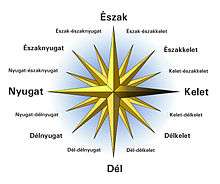dél
Hungarian

Compass rose
Etymology
Borrowing from an Oghur language, before the times of the Hungarian conquest of the Carpathian Basin (at the turn of the 9th and 10th centuries), from Proto-Turkic *düĺ (“noon”).[1] Compare Tuvan дүш (düš, “noon”), dialectal Turkish düş (“noon”).
Pronunciation
- IPA(key): [ˈdeːl]
Audio (file)
Declension
| Inflection (stem in -e-, front unrounded harmony) | ||
|---|---|---|
| singular | plural | |
| nominative | dél | delek |
| accusative | delet | deleket |
| dative | délnek | deleknek |
| instrumental | déllel | delekkel |
| causal-final | délért | delekért |
| translative | déllé | delekké |
| terminative | délig | delekig |
| essive-formal | délként | delekként |
| essive-modal | — | — |
| inessive | délben | delekben |
| superessive | délen | deleken |
| adessive | délnél | deleknél |
| illative | délbe | delekbe |
| sublative | délre | delekre |
| allative | délhez | delekhez |
| elative | délből | delekből |
| delative | délről | delekről |
| ablative | déltől | delektől |
| Possessive forms of dél | ||
|---|---|---|
| possessor | single possession | multiple possessions |
| 1st person sing. | delem | deleim |
| 2nd person sing. | deled | deleid |
| 3rd person sing. | dele | delei |
| 1st person plural | delünk | deleink |
| 2nd person plural | deletek | deleitek |
| 3rd person plural | delük | deleik |
Derived terms
- (noon): délben, delel, délelőtt, déli, délután
- (south): Dél-afrikai Köztársaság, Dél-Amerika, Dél-Európa, Dél-Karolina, délkelet, Dél-Korea, délnyugat, dél-délkelet, dél-délnyugat, délszláv, Dél-Szudán, Új-Dél-Wales
References
- Zaicz, Gábor. Etimológiai szótár: Magyar szavak és toldalékok eredete (’Dictionary of Etymology: The origin of Hungarian words and affixes’). Budapest: Tinta Könyvkiadó, 2006, →ISBN
Spanish
This article is issued from
Wiktionary.
The text is licensed under Creative
Commons - Attribution - Sharealike.
Additional terms may apply for the media files.